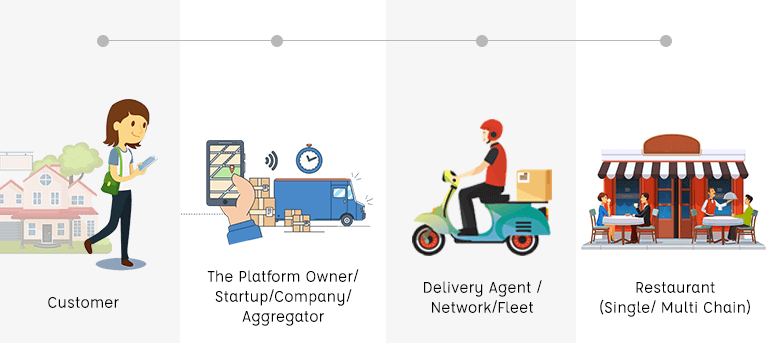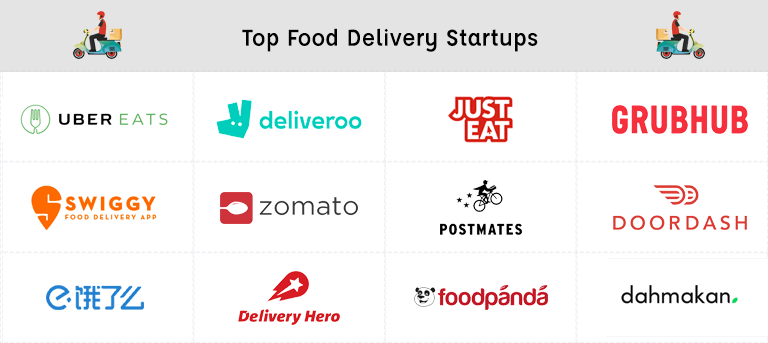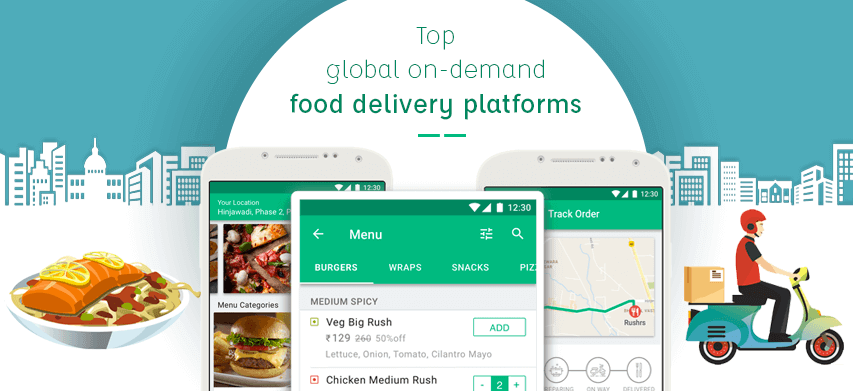How many of you have ordered food online at least once? Let me guess. Almost all of you.
Online food ordering has become a phenomenon. Thanks to the emergence of on-demand food ordering app platforms and aggregators across the globe, getting food delivered at your doorsteps from your favorite restaurant has never been easier.
Gone are the days of ordering food by calling a restaurant. Now we have apps for that.
In this blog post, we will take a deep dive into some of the best food ordering apps worldwide.
To be more specific, we will talk about food delivery platforms/aggregators/marketplaces
What’s a Food Delivery Platform/Aggregator/Marketplace?

Today’s food delivery startups mostly follow the marketplace business model. Such platforms connect local restaurants with people who want to order food via an app/website or both.
A typical food ordering platform involves 4 main players:
- Customer: The customer uses a food delivery app/website to browse through restaurants, check the menu, add items to cart and place the order. The payment is made either upfront online or after the order is received.
- Restaurant(Single/ Multi Chain): The restaurant receives the order, prepares the meal and dispatches it for delivery. They get paid for each order from the aggregator after it takes it’s cut.
- Delivery Agent /Network/Fleet: The delivery agent gets a dedicated app to receive the order, collect the ready parcel from the restaurant and deliver it to the customer’s doorsteps. The delivery agent can either be an independent worker or be employed by the restaurant/aggregator. He can also work for a third-party delivery fleet.
- The Platform Owner/Startup/Company/Aggregator: The food delivery startup provides the underlying technology to make everything work seamlessly. The primary business model is to take a commission for each order from the restaurant. Additional ways a food delivery startup makes money include charging customers, subscriptions, and sponsored ads. This is one area where a lot of thought and innovation is being seen to build a successful and sustainable food delivery business.
Online Food Delivery Market Opportunity

According to a report by Technavio, the global online on-demand food delivery services market will grow at a CAGR of close to 32 percent during the period 2017-2021. The level of funding and the number of startups in this industry have been phenomenal. From the U.S to India to China, on-demand food delivery startups are making food ordering a norm.
We have created a comprehensive list of the best food ordering apps/startups across the world. Let’s check them out.
Best On-demand Food Ordering Apps (Global List)

- Grubhub (U.S)
Launched in 2004, GrubHub is the leading food ordering marketplace with a comprehensive network of restaurant partners, huge customer base and a market capitalization of more than $2bn. GrubHub connects users with local restaurants and allows them to pick order food by cuisine and access restaurant reviews. This foodie app saves order history and makes reordering convenient. With its ‘Track Your Grub’ feature, it provides real-time delivery information to its users.
- On an average, processes around 2,40,000 orders daily - Serves around 1,200 U.S. cities and London - Has more than 6.70M users
- Deliveroo (U.K.)
Working in over 200 cities, London-based restaurant food delivery startup, Deliveroo lets its users order food from restaurant outlets that don’t have a set-up of their own and charges both the customer and the restaurant for the service. Users are charged a flat fee per order and restaurants pay a commission.
- Has more than 5,000 drivers and 300 employees - Raised around $380M in funding so far - Serves 10,000 restaurants in the U.K.
- Delivery Hero (Germany)
Founded in 2011, the global leader in online food delivery service, Delivery Hero valuation topped around $5 billion when listed on the Frankfurt stock exchange. With a presence in 30+ countries, Delivery Hero works with over 2,00,000 restaurants.
Delivery Hero is very active in acquisitions and mergers. It owns UK service Hungry House, pizza.de, Lieferheld, foodora in Germany, Baedaltong in South Korean, and Yemeksepeti in Turkey.
- Europe’s top tech startup - Currently valued at $3 bn - Processes 12M+ orders every month
- Uber Eats (U.S)
Launched in 2014, Uber Eats is a great example of a food delivery aggregator app service model. It smartly uses Uber’s existing driver fleet for delivery operations.
- Grew more than 20x from the year 2016 to 2017 - Profitable in 27 of their overall 120 global markets - Has more than 8M users in the U.S. - Surpassed $3B in sales in 2018
- Just Eat ( U.K )
Just Eat, one of the most popular food delivery services in Europe was founded in 2001. It is a search tool for local restaurants that deliver food. It gives customers the option to filter menu by cuisine and pay either by cash or card. The company makes money by charging a commission fee from the restaurants. In 2017, Just Eat enabled 21.5M customers to order more than 170M takeaways all over the world
- Covers over 82,000 restaurants - Has more than 11M active users
- Swiggy (India)
Founded in 2014, Swiggy, the online food ordering, and delivery platform strive to change the way Indians order food. Covering more than 20,000 restaurants across 12 cities, this Bengaluru-based startup has raised around $100M from its investors Naspers and Meituan-Dianping.
- Acqui-hired “48 East”, gourmet Asian food startup - Surpassed 4M orders last year - Owns a fleet of more than 20,000 delivery persons
- Zomato (India)Zomato started as a restaurant finder app and later entered into the online food ordering vertical to compete with Swiggy and Foodpanda in India.
- Operating in more than 20 countries - Acquired Runnr, Indian local logistics startup to strengthen its food delivery operations.
- Postmates (U.S.)
Founded in 2011, Postmates operates a network of couriers who deliver multiple types of goods locally including food. At CES this year, American multinational automaker, Ford announced its partnership with Postmates for the self-driving car powered deliveries.
- Surpassed 2.M deliveries in 28 markets - Has more than 13,000 Postmates (delivery agents) doing deliveries - Has partnerships with Starbucks, Apple, and Chipotle
- DoorDash (U.S.)
Founded in 2013, DoorDash is an on-demand restaurant delivery startup that provides logistics services to help restaurants in food delivery.
- Operating in more than 40 markets and 500 cities - Has around 500 employees - Acquired Y Combinator-incubated startup, Rickshaw
- Ele.me (China)
Founded in 2008, Ele.me, the Chinese food delivery giant is supported by Alibaba Group Holding, the largest e-commerce operator in China. After acquiring Baidu Waimai, Ele.me claims to have around 53.4% share of China’s food delivery market.
Ele.me offers customer-to-customer food ordering and delivery services. It has its own employees for food delivery and operates them on the basis of different food-delivery locations.
- Covers over 2000 cities in China along with 1.3M joining shops - Has 15 thousand employees, serving around 9M orders daily
- Foodpanda (Acquired, Germany)
One of the leading food ordering and delivering platforms, Foodpanda operates in 500+ cities worldwide. Delivery Hero acquired Foodpanda in late 2016 and is its parent company. Recently, Ola bought Foodpanda’s Indian business from Delivery Hero in exchange for its stock.
FoodPanda has a marked presence and wide geographical reach in the emerging markets including African countries like Nigeria and Ghana and Eastern European countries like Romania and Azerbaijan.
- Serving in five continents - Has a presence in 10 African countries and 3 in the Middle East
- Talabat (Middle East)
Founded in 2004, Talabat is the largest online food ordering platform in the Middle East. Recently, the German e-commerce company Rocket Internet acquired Talabat for $170M.
- Works with more than 1000 restaurants - Operating across 7 countries
- Dahmakan (Malaysia)
Launched in 2015, Dahmakan, Malaysian on-demand meal delivery service is the first Malaysian startup that participated in the Y Combinator and received $2.6M funding for its expansion.
Dahmakan delivers thousands of meals per month in Kuala Lumpur and Bangkok. Also, it is planning to venture into other Southeast Asian markets including Singapore, Jakarta, Manila, and Hong Kong, before going to East Asian countries like Korea and Japan.
- Has a policy of ‘no delivery fee and no minimum order’ - Processes around 1000 orders on a daily basis - In February 2017, raised 1.3M USD in seed funding
Wrapping Up!!
On-demand food delivery has become a big thing over the past few years. The sheer number of startups and the level of funding in this space is mind-boggling. With so many orders still being made over phone calls, the market size will continue to grow as more and more orders get delivered via one of the best food ordering apps.
Partner with Mobisoft to build your own on-demand foodie app
Mobisoft Infotech has deep domain expertise in on-demand app development for the sharing economy powered by state-of-the-art mobile technology. If you need app development assistance to launch your own on-demand food ordering app solution, we can offer an end-to-end technology solution that will be fully customized to your business needs.




 March 28, 2018
March 28, 2018


